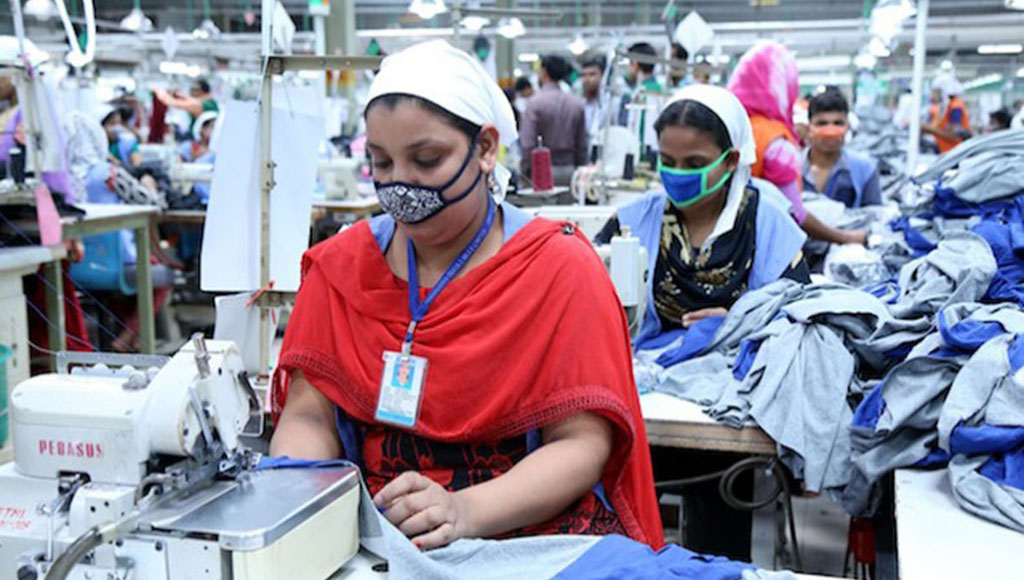Bangladesh, Cambodia, Pakistan, and Vietnam — four major apparel producers — could face a 22 per cent decline in nominal earnings by 2030 and 68 per cent by 2050 if the countries fail to invest in climate adaptation, according to a new study revealed on Monday.
These losses could result in nearly one million forgone jobs by 2030 and up to eight million by 2050, underscoring the urgent need for mitigation efforts, report says.
The study titled ‘Hot Air: How will fashion adapt to accelerating climate change?’ highlights the urgent need for these countries to implement adaptation strategies to safeguard their industries from the escalating impacts of climate change.
High heat stress days have surged by 42 per cent across five major garment production hubs including Dhaka, Hanoi, Ho Chi Minh City, Phnom Penh, and Karachi over the last 20 years, with the frequency of extreme heat events rising alarmingly, according to the study.
Bangladesh’s lack of meaningful workplace heat standards contrasts with stricter regulations in countries like Vietnam and Malaysia, creating compliance risks for international brands under the European Union’s corporate accountability laws, it says.
These gaps in standards not only threaten worker wellbeing but also pose significant operational and reputational risks for the global apparel sector.
The findings highlight an urgent need for Bangladesh to implement robust climate adaptation strategies, enforce meaningful workplace standards, and strengthen social protection mechanisms to safeguard workers and sustain its apparel industry in the face of escalating climate threats.
The report also says Bangladesh’s low purchasing power for manufacturing wages and limited social protection coverage exacerbated its climate vulnerability.
These weaknesses leave workers ill-equipped to cope with lost income and rising living costs driven by climate events.
Indoor heat risks also remain unaddressed in Bangladesh although the Accord on Fire and Building Safety introduced critical safety measures after the Rana Plaza disaster in 2013.
The Labour Act of 2006 mandates ‘adequate ventilation’ and ‘comfortable’ temperatures but lacks enforceable thresholds or specific requirements, leaving workers exposed to extreme heat conditions.
According to the report, in Bangladesh, compliance with indoor ‘comfort’ standards is certified by unregulated third parties.
While the Accord on Fire and Building Safety, established in 2013 after the Rana Plaza disaster that claimed over 1,100 lives, oversees safety and health, it excludes indoor heat regulations from its scope, a gap also present in its successor organization, the RSC.
Regarding Bangladesh, the study also says the devastating floods of July and August 2024 have compounded the industry’s vulnerabilities.
Widespread inundation caused significant production delays in garment factories and disrupted operations at the Chattogram port, a vital link in global supply chains.
The cumulative impact of these floods has reduced apparel output, adding strain to an industry already grappling with political instability and economic pressures.
Researchers warn that these climate risks are widespread, with 23 production centres reporting significant increases in high-heat days.
This threshold, which accounts for heat and humidity, marks the point at which the International Labour Organisation (ILO) advises garment workers to alternate equally between rest and work to maintain safe core body temperatures.
Researchers also report an increase in the intensity of heavy rainfall over the last two decades, further compounding climate-related risks.
Heat stress and flooding pose severe challenges to apparel production, affecting workers’ health, slowing production, and even causing the shutdown of factories, transportation, and ports.
Previous research by Cornell ILR and Schroders estimates that four key apparel-producing nations could lose up to $65 billion in export earnings by 2030 due to extreme heat and flooding.
The impacts are already being felt. In April, heatwaves in Bangladesh forced school closures and led to lower productivity and increased sick days among garment workers.
In August, Vietnam grappled with deadly floods and landslides that disrupted education and delayed the start of the school year.
The findings underline the urgent need for adaptation measures and robust social protection systems to shield workers from these escalating climate threats.
Researchers also warn that under emerging Due Diligence laws, brands could face legal liabilities for harm caused to workers by extreme climate events.
Jason Judd, executive director of Cornell University’s Global Labor Institute, emphasised that extreme heat and flooding pose significant health risks for millions of garment workers and represent material threats to the fashion industry.
He highlighted the urgent need for adaptation investments to protect workers and supply chains, stressing that these efforts must complement de-carbonisation initiatives.
Judd also underscored the importance of pairing physical adaptation measures with robust social investments, noting that one without the other would be ineffective.
He pointed to living wages as a critical example, enabling workers to manage lost workdays and rising costs associated with electricity, food, and climate-related medical expenses.
Judd called for clear and enforceable climate-labour requirements across the industry, encompassing employers, brands, investors, and lenders.
‘These are needed for the industry to adapt to climate breakdown and for major brands and retailers to meet their obligations to workers under new CSDDD rules,’ Judd added.





